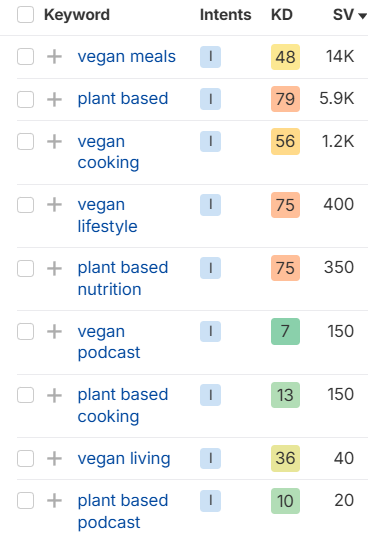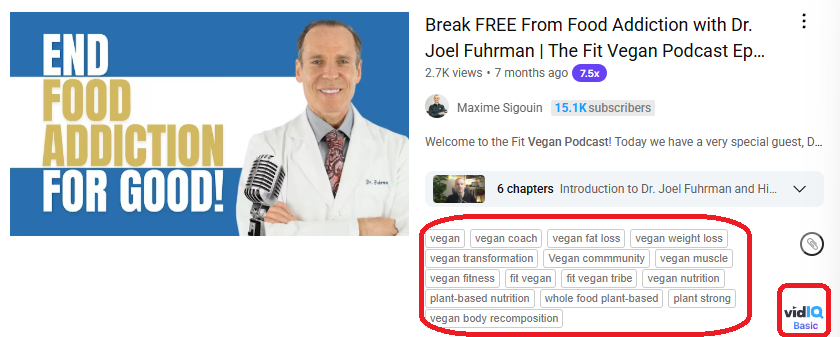Podcast Keywords 101
At some point, someone told you that podcast keywords are crucial to getting your podcast to rank on Apple, Spotify, and YouTube. You’re now scouring the internet, trying to figure out which podcast SEO keywords to use and where to put them. Before you start plugging the words “best podcast ever” into every other sentence of your podcast description, you should read this.
We’ll be describing where to find the right podcast keywords for your podcast and where to put them in your titles, descriptions, and chapters, so you can rank!
Hi, I’m Nate. I run Calico Content, a podcast and SEO agency that helps podcasts and businesses rank higher on Google, Spotify, Apple, YouTube, and beyond. We’ve done it for top-ranking shows, and we can help yours, too.
What are Podcast Keywords?
Podcast keywords, like SEO (search engine optimization) keywords, are specific phrases that searchers look up to find podcasts. They’re also how search engines and podcast directories catalog and organize your content so they can serve it to the right users.
While traditional SEO focuses on ranking on Google, podcast SEO focuses on ranking on podcast platforms.
So, how do you do that? With the right podcast keyword research! The right keywords let your audience find you when they look up a term. So, let’s find those terms!
Podcast Keyword Research
Do NOT start plugging in random keywords in your podcast description. There’s a method to this madness and a science to finding the best keywords for your podcast.
We’ll be using a workaround for traditional SEO keyword research to find your perfect podcast keywords.
1. Really Think About It
Before you use an SEO tool or start doing competitor research, start by writing down what you would look up to find a podcast like yours.
Let’s say you run a podcast about vegan cooking. You don’t need to look up anything to know that these are some of the podcast keywords your audience could be searching for:
vegan cooking
vegan living
vegan meals
vegan lifestyle
plant based
plant based cooking
plant based nutrition
vegan podcast
plant based podcast
Etc.
Already you have a handful of keywords that may be useful. But, how do you know?
Why start with your own list? So you’re not immediately influenced by your competitors’ language, as your specific niche and brand may be in a realm of its own or an untouched category. It’s important to take a step back and think who your podcast is for, before trying to imitate someone else’s strategy.
2. Use a Tool (Paid OR Free) to Test
There are a handful of different tools you can use to see if your keywords have volume. We’ll split them up by paid and free:
Paid Keyword Research Tools
If you have any of these subscriptions already, I’d advise using them over the free versions below. But, both work! Free tools may just take a bit longer.
Primarily for podcasts
Primarily for written content
Primarily for written content
Primarily for YouTube
VidIQ (also has a free version)
Primarily for YouTube
For all of these, you can submit keywords and see their estimated volume.
Keyword data from Ahrefs. KD = keyword difficulty. SV = search volume. The “I” under intent is for “informational” content.
Ausha will give you a “score” for the keyword based on volume, difficulty, and competition. Now that you know how much volume each keyword is generating, you can use that information to plan episodes and which keywords to put in that episode.
Now remember, this is just Google search volume, not actual podcast platform search volume (which I haven’t seen accurately tracked). What you’re looking for is trends. If a bunch of people search up a term on Google, looking for informational content, there’s a good chance a subset of those people would be interested in a podcast/audio version.
Free Keyword Research Tools
ChatGPT/Perplexity/Claude/etc.
VidIQ (free version)
Your Own Wonderful Brain
ChatGPT/Perplexity/Claude
If you need somewhere to start, asking your favorite AI tool for keyword suggestions is a good (albeit extremely limited) place to begin. Go on to ChatGPT/Perplexity/Claude and ask it this:
"I need high-volume, low-competition keywords for my podcast about [YOUR TOPIC] to improve discoverability on Apple Podcasts, Spotify, and other platforms.
Find me:
5 Primary Keywords - main terms describing my podcast's core topic
10 Long-tail Keywords - specific 3-4 word phrases my audience searches
5 Trending Keywords - current buzzwords in my industry
5 Question-based Keywords - common questions for episode titles
My podcast:
Topic: [Insert specific niche]
Audience: [Target listener type]
Format: [Interview/solo/educational]
Research these sources:
Podcast platform search suggestions
Google Trends
Competitor titles/descriptions
Social media trends in my niche
Prioritize keywords that balance search volume with audience relevance. Focus on terms my target audience actually uses, not industry jargon."
I asked Claude this and it gave me keywords like:
Veganuary recipes
Vegan meal planning tips
Budget-friendly vegan cooking
Vegan cooking for beginners
Vegan kitchen essentials
Etc.
You can now create content around those keywords, and begin to branch off and create your own keyword list!
Note: Remember that “keywords” are useless without answering user intent. Someone could look up “vegan cooking for beginners” and either be interested 1. Recipes 2. What a vegan can/can’t eat 3. Nutrition requirements as a new vegan, etc. It’s up to you to answer the intent from the keyword, NOT just plug a keyword.
VidIQ
For the new podcast with a limited budget, VidIQ can help you see video keyword opportunities via YouTube. As more podcasts move to the YouTube medium, these keywords will be more and more relevant to use.
Look up a podcast within your niche, and VidIQ will show you the tags/keywords they’re using.
You can then click on a keyword to see its estimated volume and competition:
Obviously the “related keywords” aren’t that relevant to your vegan podcast, but the “vegan weight loss” topic may be!
Your Own Wonderful Brain
As previously touched on, intent is more important than keywords. You want to know what episodes your audience wants to hear, what they want to take away from those episodes, and what information should be included in those episodes to provide value.
Since you’re most likely interested in the topic you're producing a podcast on, take the time to right down some things that interest you about your niche. You can go one step further and ask others in the niche what they would want to hear about.
Let’s take the vegan example again. Vegans might be interested in:
How vegan protein compares to animal protein
The most ethical vegan products available now
The best-tasting vegan products on the market
Go-to high-protein morning meals for vegans
Should I really worry about B12?
Good content cannot be fully AI-generated, so use the best form of intelligence there is: your noggin.
Where to Put Podcast Keywords
Now that you’ve come up with a list of podcast keywords, you’ll need to know where to put them so you can rank. There are a few main places they belong:
Your Episode Title
Your keyword(s) belongs in your episode title and preferably in the front. Don’t just have the keyword be the title, but create a hook that makes people want to listen. Let’s say we’re doing a show on B12 for vegans, and the keyword is “Do Vegans Need B12.” A title could be:
Do Vegans Need B12? What Most Vegans Get Wrong
Do Vegans Need B12? 10 Ways to Get It Naturally
Do Vegans Need B12? The “Brain Chemical” You Could Be Without
Your Episode Description
As with your title, your podcast SEO keywords should show up naturally, but early on, in your podcast description. Going back to our vegan B12 example:
Do vegans need B12? Missing this key vitamin could cause serious mental fog that plagues many plant-based eaters. But how do we get it? Are you getting enough? And what are some natural foods that provide your daily dose of B12?
Your Episode Chapters
Chapters or “timestamps” are what break down your episode into smaller sections. Using your primary keyword (and related keywords) can give you another chance to prove to the algorithm that your podcast is the best to educate an audience on a topic. Chapters can be:
00:00 Do Vegans Need B12?
05:15 B12 Deficiency Warning Signs
11:32 Supplements vs. Natural B12
14:55 Best Vegan Foods with B12
Etc.
Podcast/YouTube Tags
On both podcast platforms and YouTube you can add “tags” which are keywords in a list. Although this doesn't have a ton of effect on the algorithm ranking you (at least for YouTube), they’re useful to add regardless. Tags may be:
do vegans need b12, vegan b12, b12 vegan, b12 for vegans, vegan foods with b12, b12 deficiency vegan, vegan b12 deficiency, etc.
Podcast Keywords: Done. Now Make Some Great Content.
Optimizing for algorithms with podcast keywords is great, but it should always be your priority to make great content. Better content leads to more downloads, listeners, and longer listen times. Remember that podcast keywords can help elevate your episode, but by no means will float a subpar episode. Content first!
Need help strategizing your podcast?
Podcast Keywords FAQs
What Keywords Should I Use for My Podcast?
Podcast keywords will be specific for your niche, industry, and episodes. Do basic research via paid or free tools (Ahrefs, VidIQ, Ausha) to find the podcast keywords that best fit your episode.
How Do I Get 1,000 Listeners for My Podcast?
Learn, tweak, and repeat if you want to get 1,000 podcast listeners. Before publishing episodes, ensure that your titles are enticing, your intros are catchy, your content is valuable, and everything else is optimized for podcast platforms and YouTube. If you need help, reach out to us at Calico Content.
Are Podcast Keywords Important?
Podcast keywords are a key way to rank higher on podcast platforms and YouTube. That being said, having high-value content combined with optimized podcast copy will help you reach a wider audience faster.



